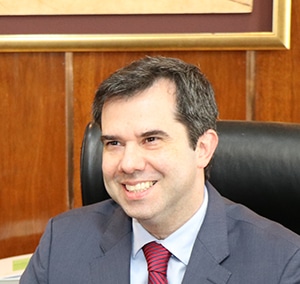José Cantero, president of the Central Bank of Paraguay sits down with Global Finance to discuss how the current state of the world is affecting Paraguay’s economy.

Global Finance: What has been the impact of the Covid-19 pandemic on the economy of Paraguay?
José Cantero: For all countries Covid 19 meant a sudden change of plans. It was like going from a pleasant show into a horror movie. In Paraguay, we started 2020 with the expectation of a 4% economic growth in all different industries, because we anticipated that all sectors would experience solid growth. In short, 2020 looked like a year of opportunity. Then came the COVID to change our plot. The history of 2020 is already written and is not encouraging for any Latin American country. There are multiple transmission channels through which the harmful effects of Covid are propagated and they produce extremely damaging impacts. Fortunately, the impact on Paraguay will not be as vehement as in other countries in the region, allowing us to anticipate a rebound and eventual recovery.
GF: What are your expectations for the rest of 2020 and 2021?
Cantero: The Central Bank foresees a 3.5% GDP decline in 2020 and we understand that it is one of the more contained ones in the region. The agriculture, livestock and construction sectors are the industries that maintain a positive dynamic, something that moderates the fall. International agencies say that Paraguay will bounce back in 2021 with a growth rate of around 6%, rising among the fastest growing in the region.
GF: “Paraguay’s greatest asset is its macroeconomic stability,” the governor said last year. Did the country maintain that stability? What did the central bank do to support the economy and contain poverty in the current recession?
Cantero: All the economic decisions that the country has made have been geared towards living up to this great challenge, but at the same time, I believe that all of them were sensible and did not violate the country’s macroeconomic strength. In the case of the Central Bank, we have reduced the monetary policy rate from a level of 4% to 0.75%. In addition, we have made liquidity available to the system for about 6.5% of GDP and added a set of macroprudential measures so that both companies and individuals can reschedule their credit obligations.
In Paraguay, international reserves remain around 24% of GDP, we project a surplus in the current account by 2020. The financial system enjoys strong indices and there is a strong commitment to return to an intertemporal balanced budget in the medium term. I believe that in Paraguay, the real custodian of macro stability is the society, because there is a social consensus that macroeconomic prudence is the hallmark that has distinguished Paraguay and that we should guarantee it.
GF: How did the country move forward in its reforms and what remains to be addressed?
Cantero: The good thing is that our society’s consensus is evolving from the importance of ensuring macroeconomic strength towards the urgent need for institutional reforms, where the main ingredients or attributes are efficiency, cost reduction, transparency, and competitiveness.
The Recovery Plan presented by the National Economic Team is quite ambitious, not only because it is geared towards alleviating the situation with assistance to the most vulnerable sectors of society or promoting credit for SMEs or infrastructure investments to leverage the multiplier, but also because it implements significant structural reforms. The plan includes measures and packages of laws to improve state procurement processes with relevant savings, optimization of the state structure and a civil reform of the state. Within this guidance, a set of laws has also been introduced to improve the country’s business environment. In addition, there is a pipeline of infrastructure investments under the private public alliance (PPP) modality, which complements the public investment agenda in infrastructure aimed at reducing the country’s transaction costs and improve competitiveness. The Covid crisis is for Paraguay an opportunity for transformation.
GF: What are the main risks? What can be done to limit these risks?
Cantero: I believe that the greatest risk for any country facing this extreme situation is that passion reigns over reason, that spaces of constructive dialogue are suffocated by simplistic proposals, that measures that appear easy violate the economic foundations necessary for the recovery of the country. That’s why, when much is at stake, the leadership of each of us is the key. In times of crisis, we must appeal to reason and constructive dialogue. It is the only way to keep us afloat and steer us towards a more resilient, integrated and friendly global economy.
GF: What are your expectations for Latin America as a region?
Cantero: The outlook for the region is already written and it is not encouraging, as many countries in Latin America already had a lot if dengue fever cases before catching COVID 19. I make it clear that this is not the case in Paraguay, as we have confronted COVID with strong macro fundamentals. Regarding the future of the region, I do not find myself pessimistic, because opportunities for transformation, more than ever, are present on the table.



